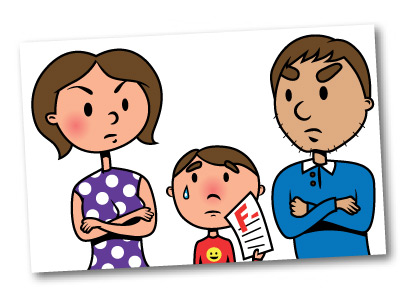Parenting practices have evolved through the years. In the Victorian era, children were dressed as miniature adults and treated as such. Disobedience was met with physical punishment. Children were expected to be seen and not heard. Over the years, children were recognised as their own entity and privileges were accorded to them. These include being allowed to play, attend school for formal education and more recently, protection against abuse, including spanking in some countries.
Perhaps you may think that spanking is not abuse but a necessity. How can children be disciplined if they are not spanked when they disobey? Imagine this scenario. You are working under a boss who insists that you toe the line. One day, you came back to the office thirty minutes late after your lunch break. Your boss, upon discovering your absence, plants himself firmly in your cubicle and, upon your return, asks you in a stern voice where you were. You nervously reply that you had been delayed by traffic jam. He then asks you for the assignment given to you and again you meekly reply that you were still working on it. Now, imagine if your boss were to then pull out a cane and hit you on your back. Or, slap you with his hands for answering back and being irresponsible.
The next action on your part would likely be one of two things, either lodge a police report citing physical abuse or submit your resignation effective immediately. And yet, this is the scenario faced by thousands of children, not only in Malaysia but in various countries all over the world. Sadly, most parents feel that this is acceptable. If no adult agrees that it is acceptable for their bosses to hit them, why do many feel that hitting a child is not only acceptable, but also right?
Lessons From The Cane
It cannot be denied that children test our patience, often when patience is at its thinnest. This may be in the form of poor exam results, destruction of decorative items, sibling squabbles, poor schoolwork and apparent addiction to games (game console, computers, etc.) yet caning and spanking will not resolve these problems. Sit down and talk to them in a calm manner to find out the root cause of the problems. It will be more beneficial in the long term.
Take for example a child who has not done his school work and, after being asked to do, meekly replies that he has left his work in school. Or a child who rushes through his school work so that he could play on the game console or computer. What would spanking the child solve? It will only teach him to lie the next time he is asked about his homework. He will also cherish the times his parents stay back at work as it will allow him to play for a longer period. Questions about school and friends will be met by a sullen “Fine”. At the end of the day, the bond between that child and his parents has been sullied.
In most instances, spanking or hitting only serves as an outlet for the ‘abuser’, i.e. the one who does the spanking. It does not teach the child anything other than the fact that it is ok to hit another human. Studies have shown physical punishment to be demeaning, humiliating and degrading to children, turning them into submissive individuals. Corporal punishment has an adverse impact on academic achievement. Individuals who were hit as children are more likely to grow up into abusive individuals, often hitting their own spouse and children. This is clearly seen in our society where parents justify their action of hitting their children by saying “I was hit as a child yet I turned out alright”.

The alternative when your child comes home with a bad report card is to ask him why he failed. Instead of screaming about how much money has been wasted on tuition, you can do it over a cup of hot drinks in a calm manner and environment. This will help him to open up and admit why he failed in order for you to find a solution. More likely than not, his results will show a marked improvement in the next exam.
Similarly, if he were to break a vase in the living room, hitting him will not bring the vase back. Take a mature approach instead by sitting him down to explain the value of the vase (not just monetary but also emotional) and the potential injuries he could have sustained. This will go a long way in preventing other similar incidents. This would also be a good time to remind him about not running, jumping or playing with projectiles in the house. After all, if our spouses were to break a plate we are not going to hit them, are we?
A child who is repeatedly hit will become more withdrawn, aggressive and less trusting. Who is there left to trust if the most important person in your life, i.e. your parents, hurt you?
Disciplining Without The Cane
Not spanking does not equate to lack of discipline. Words can have a greater and longer lasting impact than the cane. As parents, we must first decide on the limits and what constitutes good and bad behaviour.
When your child misbehaves, explain to him why it is wrong. Instead of saying “No!” at the top of your voice, tell him why his actions are not acceptable. When your child climbs up onto your lap and presses all the keys on your computer, including the shutdown button, he is not being naughty but merely being naturally curious. “What is this thing that my parent finds more amusing and interesting than me?”

Instead of smacking his fingers or buying him his own laptop, perhaps you could give him a hug and a kiss, shut your computer and spend some time with him. Tell him nicely that the computer is mummy or daddy’s work and that he is not allowed to touch it. Allowing him to access the internet on one occasion and scolding him for touching the computer on another will only confuse him further.
Some antics require more serious actions, like hitting a sibling, lying to a parent or teacher, or playing with dangerous objects such as electrical sockets and sharp equipment. Hitting and lying often don’t just happen though. Just like Newton’s law, they are often a reaction to an action. Perhaps the other sibling wasn’t so innocent after all. Maybe he lied because he was scared of being hit. Get to the bottom of the problem by talking to him. If it happens again, a time-out (particularly when children fight) may be used. Explain to him that the time out is to allow him to cool down and think of his action, not just a punishment.
If you find that your temper is rising, give yourself a time-out from your children. Go to your room to relax for a few minutes and regain your composure before facing your children. This could make a big difference in how you handle the situation.
An educational contribution by Malaysian Paediatric Association.







Comments